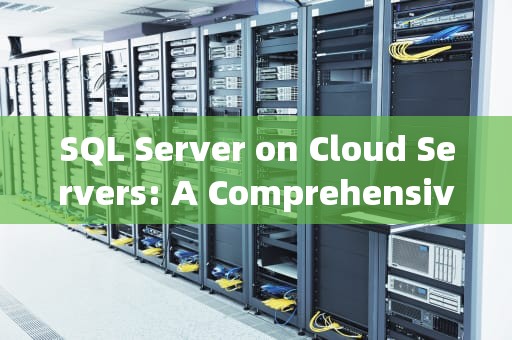Introduction

SQL Server is a popular relational database management system (DBMS) that powers many businesses worldwide. Its robustness, scalability, and reliability make it an ideal choice for data-intensive applications. With the advent of cloud computing, SQL Server has been ported to various cloud platforms such as Microsoft Azure, Amazon Web Services (AWS), and Google Cloud Platform (GCP). This article provides a comprehensive guide on how to set up SQL Server on cloud servers, including the benefits, challenges, and best practices.
Benefits of SQL Server on Cloud Servers
Scalability
Cloud servers offer unparalleled scalability compared to traditional on-premises servers. You can easily scale up or down your SQL Server instances based on your workload demand. This ensures that you pay only for the resources you use, thereby reducing costs.
Disaster Recovery
Cloud providers offer built-in disaster recovery solutions that ensure your data remains safe even in the event of a disaster. You can quickly recover your SQL Server instance from any failure using the backup and restore features provided by the cloud provider.
Security
Cloud providers invest heavily in security to protect their customers' data. They employ multiple layers of security, including encryption at rest and in transit, access controls, and audit trails. You don't need to worry about maintaining your own security infrastructure when using cloud servers.
Simplified Management
Cloud providers provide easy-to-use management consoles that allow you to manage your SQL Server instances from anywhere, anytime. You can monitor performance, configure settings, and troubleshoot issues without having to be physically present at the server location.
Challenges of SQL Server on Cloud Servers
Performance Latency
While cloud servers offer excellent scalability, there may be some latency involved in scaling up or down your SQL Server instance. This latency can impact application performance, especially for applications that require high response times.
Data Locality
Data locality is critical for applications that require low-latency access to data. While cloud providers offer global data centers, data transfer between regions can introduce latency. You need to consider this factor when choosing a cloud provider and data center location.
Cost Management
While cloud servers offer pay-as-you-go pricing models, they also have hidden costs such as storage fees, network charges, and transaction fees. It's essential to understand these costs before committing to a cloud provider to avoid unexpected expenses.
Security Concerns
Despite the advanced security measures employed by cloud providers, there are still security concerns associated with storing sensitive data in the cloud. You need to evaluate the security policies of your chosen cloud provider and implement additional security measures if necessary.
Best Practices for SQL Server on Cloud Servers
Choose the Right Cloud Provider
Select a cloud provider that offers reliable services and supports SQL Server. Look for providers that offer dedicated resources such as CPU cores, RAM, and storage capacity to ensure optimal performance for your SQL Server instances. Consider factors such as cost, availability of data centers, and customer support before making a decision.
Optimize Your SQL Server Configuration
Configure your SQL Server instance according to your workload requirements. Use best practices such as indexing, query optimization, and partitioning to improve performance and reduce maintenance overhead. Consider using auto-scaling groups to automatically adjust资源配置 based on workload demand.
Implement Data Locality Strategies
To minimize latency, consider implementing data locality strategies such as storing frequently accessed data in the same region or using regional data centers. You can also use caching techniques such as memory caching or disk caching to further reduce latency.
Monitor Performance and Optimize Costs
Regularly monitor your SQL Server instance's performance using tools provided by the cloud provider or third-party monitoring solutions. Identify bottlenecks and take appropriate actions to optimize performance. Also, track your usage patterns and adjust resource allocation accordingly to optimize costs.
Stay Up-to-Date with Security Updates
Stay informed about security updates and patches released by the cloud provider and apply them promptly. Implement additional security measures such as multi-factor authentication, encryption at rest, and in transit protection to further enhance your SQL Server instance's security posture.
Case Studies: Successful Deployments of SQL Server on Cloud Servers
Case Study 1: E-commerce Company with Global Customer Base
An e-commerce company with a global customer base deployed its SQL Server instances on Microsoft Azure to handle large volumes of transactional data. By leveraging Azure's auto-scaling groups and regional data centers, they achieved low-latency access to data across the globe while minimizing costs. The company also implemented disaster recovery solutions to ensure business continuity during outages. As a result, they saw significant improvements in application performance and customer satisfaction rates.
Case Study 2: Healthcare Organization with HIPAA Compliance Requirements
A healthcare organization with HIPAA compliance requirements deployed their SQL Server instances on Amazon Web Services (AWS) to ensure strict security measures were followed for storing sensitive patient data. By utilizing AWS's multi-factor authentication, encryption services, and audit trails features, they achieved HIPAA compliance while reducing their security burden. They also benefitted from AWS's disaster recovery capabilities during natural disasters affecting their physical infrastructure. As a result, they gained confidence in their ability to protect patient privacy while providing timely medical care to patients worldwide.
随着互联网的普及和信息技术的飞速发展台湾vps云服务器邮件,电子邮件已经成为企业和个人日常沟通的重要工具。然而,传统的邮件服务在安全性、稳定性和可扩展性方面存在一定的局限性。为台湾vps云服务器邮件了满足用户对高效、安全、稳定的邮件服务的需求,台湾VPS云服务器邮件服务应运而生。本文将对台湾VPS云服务器邮件服务进行详细介绍,分析其优势和应用案例,并为用户提供如何选择合适的台湾VPS云服务器邮件服务的参考建议。

工作时间:8:00-18:00
电子邮件
1968656499@qq.com
扫码二维码
获取最新动态
